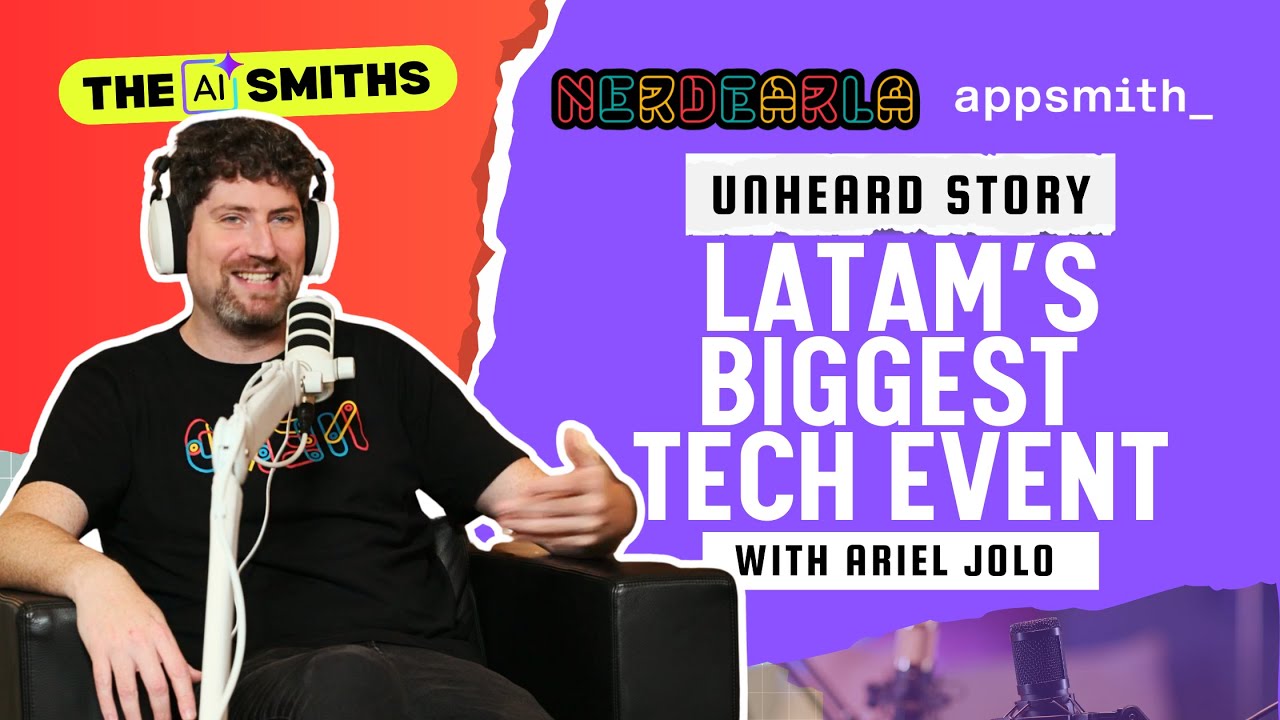Showcasing Latin America’s Tech Talent and Taking DevRel Beyond Borders


Jolo is the co-founder of Nerdearla, Argentina’s largest tech conference. He’s tapping into the global DevRel community, starting with Latin America (LatAm). Jolo has joined us to discuss how he’s built a space where devs can connect over shared cultures and challenges, as well as how to discover the joys of finding a community that shares your own language when (and where) you least expect it.

Nerdearla turned beer night into a tech movement
Before founding Nerdearla, Jolo was a sysadmin with an inclination for advertising and a strong desire to be far removed from math and programming. Given this was when DevOps and DevRel weren’t even named concepts or career opportunities — yet.
His focus on the human side of tech led him to organize a regular gathering of developers and IT people together in Buenos Aires for a few beers, which soon moved from a weekly to a bi-monthly event. They called this gathering “Sysarmy”.
“”“Being three or four beers in wasn’t the best time to make a production change, so I said, ‘We should host an event during the day, in a controlled environment.’”
Jolo fondly recalls how Sysarmy wasn’t about curated talks and presentations but a community-driven event where devs would spend Friday nights talking about work. Things gradually began to shift, and they started their first co-working event. This was followed by a small hackathon, from which the casual meetups snowballed into something bigger — Nerdearla.
In essence, Nerdearla was born from the desire to keep the party going, even after the beers ran out. What started with 60 people in a basement grew into a national event with tens of thousands of attendees coming in from across Buenos Aires, Santiago, and Mexico, with plans to expand to Spain in 2025. And Jolo’s keeping it real, focusing on re-establishing in-person meetups.
“Even when we were going virtual, we maintained the in-person meetups because the truth is that nothing replaces in-person connections, no matter how much one tries one-on-one.”
Despite the initial success from streaming the conference online, the decision to return to hybrid meetings is Nerdearla’s commitment to digital outreach without losing sight of its local spirit. Jolo believes the energy of in-person collaborations fuels gatherings with enough momentum to grow into long-lasting communities.
DevRel is about community, and community has no borders
DevRel is all about building a community without borders. However, Jolo believes that the LatAm community has historically played catch-up in the shadows of North American and European tech giants, who drive the industry’s pace. In this equation, developers from the Global South are more often implementers, adapting technologies made in the North rather than building things from scratch.
“It’s very different. Apart from the geopolitical and historical issues, there’s also a scale issue. I think we are very much implementers. We are people who receive all that technology that is developed here in North America and Europe. And I’m not saying that nothing is developed in Latin America, but I’m speaking of scale, volume, and the main solutions that we all use today.”
This dependency has trickled its way down the stack. Jolo states how the influence of tech titans like Microsoft and Amazon is felt by local cloud providers and LatAm startups that rely on their services.
“”“There is a statistic of for every dollar invested in a startup, how much goes to Amazon? How much goes to Microsoft? You don’t compete against a company that’s going to be spending 100 million dollars a year on an AI engineer.”
Despite this, the LatAm tech scene is by no means stagnant or subordinate: There are unicorns and large companies that employ thousands, handle millions of transactions, and rival global startups in quality and execution. It’s also evolved its own culture.
The LatAm DevRel scene stands out thanks to its more grassroots and scrappy nature. It has retained a sense of intimacy that the United States and Europe don’t have anymore, uniting developers not just by code but by language, humor, and working on shared cultural challenges.
With fewer guardrails and a more laser-focused field of action, LatAm communities can have the uncomfortable yet necessary conversations that larger ecosystems tend to steer clear of. One of LatAm’s biggest contributions to the global DevRel scene is showcasing how a community doesn’t need to fill stadium-sized stages to be successful.
Engaging and inspiring the next generation of builders
The challenge of honoring the heroes of the past while keeping up with what excites the next generation is a balancing act Nerdearla frequently faces. Being too nostalgic could alienate new audiences, and only chasing trends takes away from the conference’s identity. Nerdearla’s lineup of speakers has included global tech icons like Alan Kay and Brian Kernighan, but as Jolo points out, the legends of yesterday don’t draw in the same crowds YouTubers are able to these days.
Jolo draws a comparison between the legendary status of figures like Messi and tech pioneers and how the new generation gravitates toward visible cultural icons instead of computing legends, like the creator of Unix, despite their immense impact.
“All these people who literally changed the history of humanity are not the figures that most attract our public. Today, you bring a person who is creating content on YouTube, who is doing courses, and maybe you’ll bring in many more people than someone who changed the history of Unix.”
This applies to concepts, too. For the younger generation, legacy systems that were once groundbreaking have faded into the background, and not having grown up with them makes it harder to fully grasp their impact.
“”“People don’t realize kids today don’t know what a filesystem is. In fact, it happens to me that when I save a file on my cell phone, I don’t know where it is.”
This shift raises an important question: How do you engage the new generation in community building when their interests and frame of reference for technology are so different?
If code is the language, community is the translator
According to Jolo, the answer lies in DevRel and making things inclusive across different eras and cultures by having a platform to celebrate tech heroes while also spotlighting the fresh perspective brought by local and digital personalities. Connecting these different eras, people, and places shows how you can foster the kind of innovation that LatAm and Nerdearla bring to the tech world.
“You keep being you and try to involve people who have another type of mindset and come with another set of technology.”
Whether it be through in-person empanadas or live streams, the Nerdearla community showcases the best of DevRel and how natural interactions (even just running into someone who speaks your language in the lunch queue) can lead to new ideas and collaborations.
Trusted by Over 100,000 Developers Worldwide
Find out why developers prefer Appsmith for its intuitive UI, open-source flexibility, and extensive integration options over Appian.


